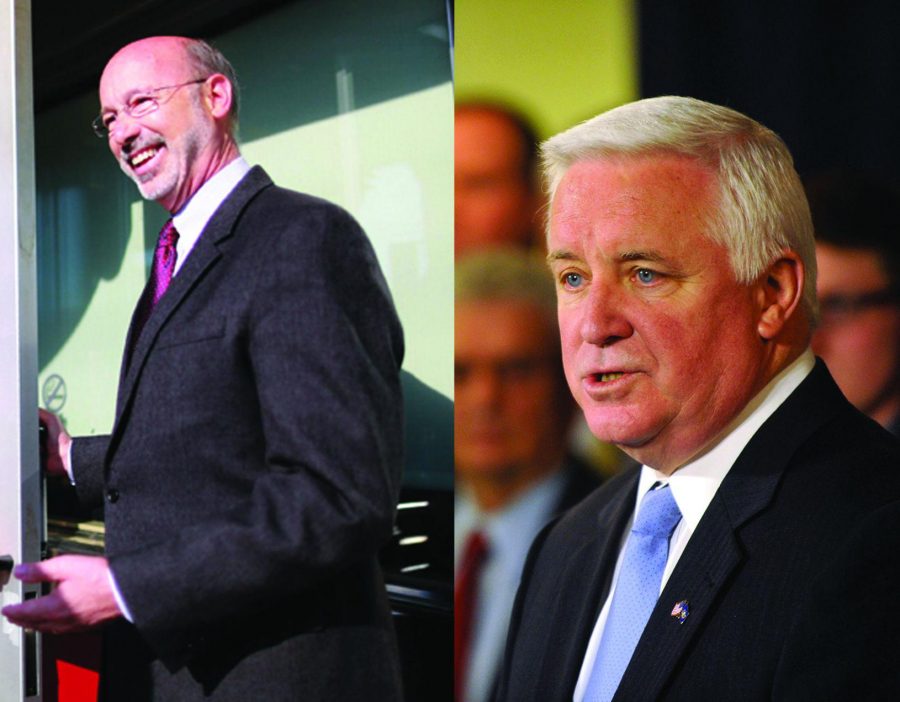Election day: Where they stand
November 4, 2014
Tom Wolf
-Obtained his B.A. from Dartmouth College, his M.A. from the University of London and his Ph.D. from MIT.
-Grew up and resides in York County.
-Served in the Peace Corps for two years doing agricultural and irrigation projects in rural India.
-Returned to the U.S. and worked as a forklift operator at his family’s building product company, which he later owned and operated as a family business with his two cousins.
-Previously served on an economic development board and on the Pennsylvania Legislative Commission on Urban Schools during Robert Casey’s administration and as the state Secretary for Revenue during Edward Rendell’s administration.
Jobs:
Wolf supports the creation of jobs through the Marcellus Shale industry and believes the state must invest in manufacturing to attract shale industry opportunities. Wolf plans to institute a cash-back rewards system, through which the state will give cash payments of up to five percent of a manufacturing company’s taxable payroll if it increases its annual taxable payroll by at least $1 million. Wolf also plans to equip high school students for the technical job market by aligning academic curriculum with modern skills and have local manufacturers identify training and skill needs. Wolf also supports increasing minimum wage to $10.10 and raising tipped minimum wage to 70 percent of the minimum wage.
Marijuana:
Wolf supports legalizing medical marijuana, as well as the decriminalization of marijuana of less than an ounce. In terms of recreational marijuana, Wolf feels that Pennsylvania should not consider legalizing marijuana use until the impact of such legalization can be determined in other states, such as Colorado and Washington.
Higher Education:
Wolf supports designing state programs to support veterans, such as the creation of veteran support centers at state-funded colleges and universities, and grating in-state tuition rates to all veterans. Wolf also supports creating a “Deserving Scholars” program, in which high-achieving students from low-income families will receive higher education information packets and up to six waivers for application fees to state-associated schools.
Wolf says raising tuition costs should be a last resort in addressing higher education budget costs. He plans to reverse Governor Corbett’s budget cuts and develop a five-year funding plan, develop challenge grants to give schools incentives to trim costs and reduce Pennsylvania Higher Education Assistance Agency’s costs and develop a plan to lower and subsidize student loan interest rates using Marcellus Shale extraction fees.
Equal Rights:
Wolf plans to implement a state anti-discrimination law to make sexual orientation and gender identity and expression a protected class, meaning citizens would be protected under law against discrimination — particularly in pay disparities. Wolf also plans to establish a minimum percentage of government contracts that the state should award to women, minority and disabled-owned businesses.
Wolf supports the state ruling on same-sex marriage, and he personally thanked Attorney General Kathleen Kane for not defending the ban in federal court.
Liquor Privatization:
Wolf does not support liquor privatization, and he supports using revenues to fund programs for the elderly and in-state students.
Tom Corbett
-Born in Philadelphia and raised in Shaler Township outside of Pittsburgh.
-Completed his undergraduate education at Lebanon Valley College in Annville, Pa. and received his law degree from St. Mary’s University School of Law in San Antonio, Texas.
-Spent a year as a civics and history teacher at Pine Grove Area High School in Schuylkill County after graduating from college.
-The Reagan administration hired Corbett as an assistant United States attorney for the Western District of Pennsylvania, where he focused on organized crime and drug enforcement.
-In 1989, President George H. W. Bush appointed Corbett to be the United States Attorney for Western Pennsylvania.
Jobs:
Corbett plans to lower taxes for small businesses, decrease regulations for business owners and cut Pennsylvania unemployment. State unemployment is at 5.8 percent, lower than the national average of 6.1 percent. In Corbett’s first term, Pennsylvania added 184,000 jobs.
Corbett does not support raising the minimum wage in Pennsylvania, and displays statistics on his website from the
Pennsylvania Chamber of Business and Industry, which show that raising the minimum wage could result in 28,000 to 119,000 jobs being lost.
Marijuana:
Corbett opposes decriminalizing marijuana, even in small amounts, in Pennsylvania. Corbett opposes legalizing marijuana for recreational use in any form. Corbett does support the use of medical marijuana except in the case of severe cases of seizures, especially in children, but has said use should be limited to a select hospitals in Pennsylvania..
Higher Education:
Corbett, a former teacher, has said on multiple occasions that he believes an educated workforce is important for the future of the state. When he took office, Pennsylvania had a $4.2 billion budget deficit and the federal government cut education spending. In his term as Governor, Corbett focused on creating scholarships, grants and tax credits for education such as the “Ready to Succeed” scholarship for middle-income college students and the “Ready to Learn” grant to provide funding to elementary school classrooms to ensure that children keep pace with their grade levels.
Equal Rights:
Corbett said he would not attempt to overturn Pennsylvania’s ruling to allow same-sex marriages, though it goes against his faith as a Roman Catholic.
Corbett opposes abortion and supports restricting access to abortions within the state. His “Women for Corbett” campaign aims to attract more women to support him, and says more than 77 percent of Pennsylvania’s budget is controlled by women in Tom Corbett’s administration.
Liquor Privatization:
Corbett supported campaigns to sell beer and wine in supermarkets such as Giant Eagle, which passed in 2013. He supports the privatization of liquor and the phasing out of state-owned liquor stores. While in office, the state took several stops to move the sale of wine and spirits to private vendors as opposed to state control.








